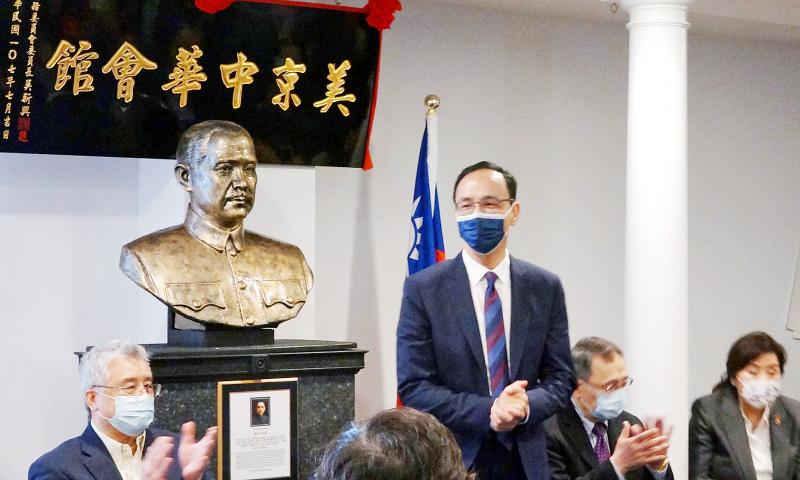Chinese Nationalist Party (KMT) Chairman Eric Chu (朱立倫) has reiterated the KMT’s historically close ties with the US, saying that the party continues to fight against communism and compete with the Chinese Communist Party regarding values and political systems, the KMT said in a statement yesterday.
Chu, who is on an 11-day trip to the US, made the remarks during a visit to the Hoover Institution at Stanford University in California on Thursday, and highlighted that the KMT and the US share memories of fighting side by side.
The US and China, which was ruled by the KMT at the time, were allies during World War II, and more than 250,000 US personnel served in what was known as the “China-Burma-India” theater.

Photo: CNA
The KMT has fought against communism for the past 100 years and in bloody battles to defend Taiwan, but is still willing to maintain exchanges with China’s private sector, Chu said.
While at the Hoover Institution, Chu met with US experts and academics, including political sociologist Larry Diamond and political scientist Kharis Templeman, discussing issues related to cross-strait security and relations.
The US academics raised concerns about Taiwan’s local government elections at the end of the year, to which Chu expressed cautious optimism, the KMT said in the statement.
In addition to controlling more than two-thirds of the counties and cities in Taiwan, the KMT would field outstanding candidates to challenge for the municipalities, counties and cities that it does not control, Chu said.
At a press event with Taiwanese media in Washington on Sunday, Chu said he would reopen the KMT’s representative office in the US after 14 years.
Chu said the KMT, Taiwan’s main opposition party since 2016, had not had a voice in Washington since the closure of its representative office, and the aim of reinstating it was to enable the US to better understand the party’s position and the different voices of Taiwan.
The chairman is to attend a plaque-unveiling ceremony to reopen the KMT’s liaison office in Washington tomorrow. The party closed it in 2008 shortly after the election of Ma Ying-jeou (馬英九) as president.
Asked if the move was in any way linked to him possibly running for the presidency in 2024, Chu rejected the idea, saying that it was part of his job as the party chairman to engage in party politics.
Reopening the office would also establish a communications channel with the US for future KMT presidential candidates, Chu added.

Taiwan would welcome the return of Honduras as a diplomatic ally if its next president decides to make such a move, Minister of Foreign Affairs Lin Chia-lung (林佳龍) said yesterday. “Of course, we would welcome Honduras if they want to restore diplomatic ties with Taiwan after their elections,” Lin said at a meeting of the legislature’s Foreign Affairs and National Defense Committee, when asked to comment on statements made by two of the three Honduran presidential candidates during the presidential campaign in the Central American country. Taiwan is paying close attention to the region as a whole in the wake of a

President William Lai (賴清德) has appointed former vice president Chen Chien-jen (陳建仁) to attend the late Pope Francis’ funeral at the Vatican City on Saturday on his behalf, the Ministry of Foreign Affairs said today. The Holy See announced Francis’ funeral would take place on Saturday at 10am in St Peter’s Square. The ministry expressed condolences over Francis’ passing and said that Chen would represent Taiwan at the funeral and offer condolences in person. Taiwan and the Vatican have a long-standing and close diplomatic relationship, the ministry said. Both sides agreed to have Chen represent Taiwan at the funeral, given his Catholic identity and

Lawmakers from the Democratic Progressive Party (DPP) yesterday established a friendship group with their counterparts in Ukraine to promote parliamentary exchanges between the two countries. A ceremony in Taipei for the Taiwan-Ukraine Parliamentary Friendship Association, initiated by DPP Legislator Chen Kuan-ting (陳冠廷), was attended by lawmakers and officials, including Deputy Minister of Foreign Affairs Francois Wu (吳志中) and European Economic and Trade Office in Taiwan Director Lutz Gullner. The increasingly dire situation in Ukraine is a global concern, and Taiwan cannot turn its back when the latter is in need of help, as the two countries share many common values and interests,

Chinese Nationalist Party (KMT) Chairman Eric Chu (朱立倫), spokeswoman Yang Chih-yu (楊智伃) and Legislator Hsieh Lung-chieh (謝龍介) would be summoned by police for questioning for leading an illegal assembly on Thursday evening last week, Minister of the Interior Liu Shyh-fang (劉世芳) said today. The three KMT officials led an assembly outside the Taipei City Prosecutors’ Office, a restricted area where public assembly is not allowed, protesting the questioning of several KMT staff and searches of KMT headquarters and offices in a recall petition forgery case. Chu, Yang and Hsieh are all suspected of contravening the Assembly and Parade Act (集會遊行法) by holding